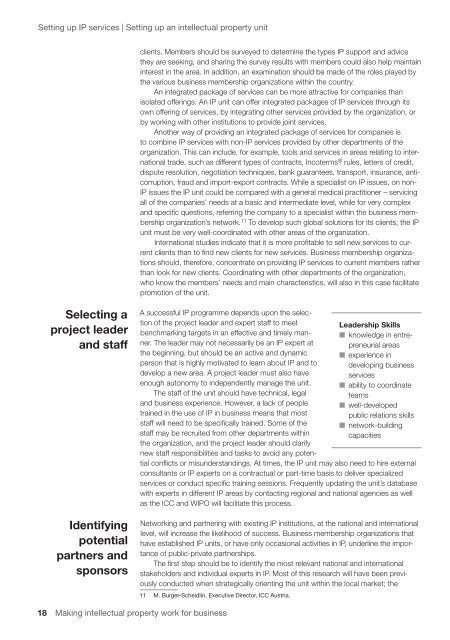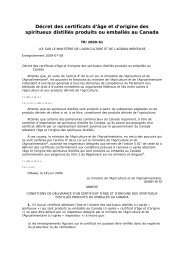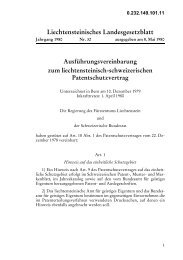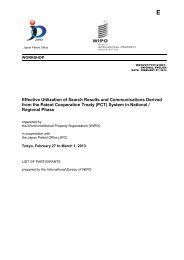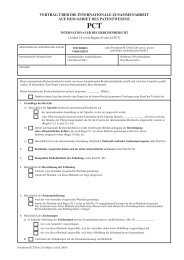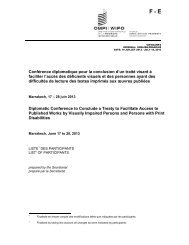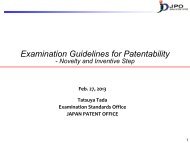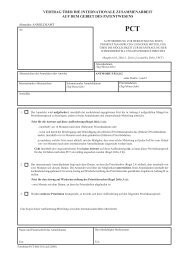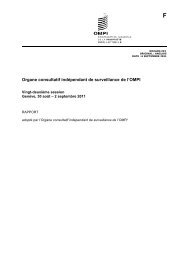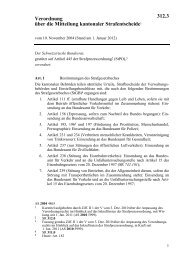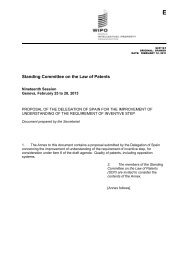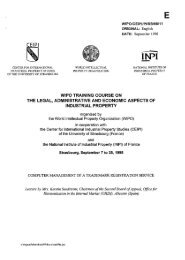Making intellectual property work for business - World Intellectual ...
Making intellectual property work for business - World Intellectual ...
Making intellectual property work for business - World Intellectual ...
You also want an ePaper? Increase the reach of your titles
YUMPU automatically turns print PDFs into web optimized ePapers that Google loves.
Setting up IP services | Setting up an <strong>intellectual</strong> <strong>property</strong> unit<br />
Selecting a<br />
project leader<br />
and staff<br />
Identifying<br />
potential<br />
partners and<br />
sponsors<br />
18 <strong>Making</strong> <strong>intellectual</strong> <strong>property</strong> <strong>work</strong> <strong>for</strong> <strong>business</strong><br />
clients. Members should be surveyed to determine the types IP support and advice<br />
they are seeking, and sharing the survey results with members could also help maintain<br />
interest in the area. In addition, an examination should be made of the roles played by<br />
the various <strong>business</strong> membership organizations within the country.<br />
An integrated package of services can be more attractive <strong>for</strong> companies than<br />
isolated offerings. An IP unit can offer integrated packages of IP services through its<br />
own offering of services, by integrating other services provided by the organization, or<br />
by <strong>work</strong>ing with other institutions to provide joint services.<br />
Another way of providing an integrated package of services <strong>for</strong> companies is<br />
to combine IP services with non-IP services provided by other departments of the<br />
organization. This can include, <strong>for</strong> example, tools and services in areas relating to international<br />
trade, such as different types of contracts, Incoterms ® rules, letters of credit,<br />
dispute resolution, negotiation techniques, bank guarantees, transport, insurance, anticorruption,<br />
fraud and import-export contracts. While a specialist on IP issues, on non-<br />
IP issues the IP unit could be compared with a general medical practitioner – servicing<br />
all of the companies’ needs at a basic and intermediate level, while <strong>for</strong> very complex<br />
and specific questions, referring the company to a specialist within the <strong>business</strong> membership<br />
organization’s net<strong>work</strong>. 11 To develop such global solutions <strong>for</strong> its clients, the IP<br />
unit must be very well-coordinated with other areas of the organization.<br />
International studies indicate that it is more profitable to sell new services to current<br />
clients than to find new clients <strong>for</strong> new services. Business membership organizations<br />
should, there<strong>for</strong>e, concentrate on providing IP services to current members rather<br />
than look <strong>for</strong> new clients. Coordinating with other departments of the organization,<br />
who know the members’ needs and main characteristics, will also in this case facilitate<br />
promotion of the unit.<br />
A successful IP programme depends upon the selection<br />
of the project leader and expert staff to meet<br />
benchmarking targets in an effective and timely manner.<br />
The leader may not necessarily be an IP expert at<br />
the beginning, but should be an active and dynamic<br />
person that is highly motivated to learn about IP and to<br />
develop a new area. A project leader must also have<br />
enough autonomy to independently manage the unit.<br />
The staff of the unit should have technical, legal<br />
and <strong>business</strong> experience. However, a lack of people<br />
trained in the use of IP in <strong>business</strong> means that most<br />
staff will need to be specifically trained. Some of the<br />
staff may be recruited from other departments within<br />
the organization, and the project leader should clarify<br />
new staff responsibilities and tasks to avoid any poten-<br />
tial conflicts or misunderstandings. At times, the IP unit may also need to hire external<br />
consultants or IP experts on a contractual or part-time basis to deliver specialized<br />
services or conduct specific training sessions. Frequently updating the unit’s database<br />
with experts in different IP areas by contacting regional and national agencies as well<br />
as the ICC and WIPO will facilitate this process.<br />
Net<strong>work</strong>ing and partnering with existing IP institutions, at the national and international<br />
level, will increase the likelihood of success. Business membership organizations that<br />
have established IP units, or have only occasional activities in IP, underline the importance<br />
of public-private partnerships.<br />
The first step should be to identify the most relevant national and international<br />
stakeholders and individual experts in IP. Most of this research will have been previously<br />
conducted when strategically orienting the unit within the local market; the<br />
11 M. Burger-Scheidlin, Executive Director, ICC Austria.<br />
Leadership Skills<br />
■■<br />
knowledge in entrepreneurial<br />
areas<br />
■■<br />
experience in<br />
developing <strong>business</strong><br />
services<br />
■■<br />
ability to coordinate<br />
teams<br />
■■<br />
well-developed<br />
public relations skills<br />
■■<br />
net<strong>work</strong>-building<br />
capacities


